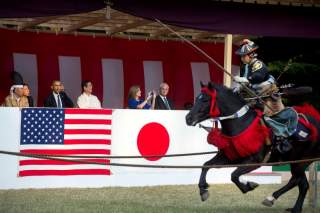Tokyo Keeps Washington Waiting on Defense
"For Washington, the nation’s 'most important alliance' might have gained a reliable partner at exactly the right time, even if patience is required."
“After April, [Abe] will have to try to enact the security-related bills, or amend existing laws, in order to make it possible for the SDF to start exercising the right of collective self-defence,” he said.
“I would disagree with the description of Japan as a pacifist country…We support most of the wars the U.S. has fought, so we are not pacifist, we are isolationist. And to the isolationist Japan, what Mr. Abe has been trying to do is uncomfortable, so there is a limit to what he can do and there will be a big debate again after April next year.”
Should the main opposition Democratic Party of Japan score an upset win, Michishita said U.S.-Japan ties would not change noticeably, given the minor differences between national security guidelines drawn up by the center-left DPJ when previously in government.
Japan analyst Robert Dujarric, director of the Institute of Contemporary Asian Studies in Tokyo, agrees that Japan-U.S. ties would continue heading in the same direction for the time being, with China remaining the biggest issue.
“The main question is if there’s going to be war with China, and if so, how will the U.S. and Japan fight it? That’s a very big issue. From the Japanese side, the question is whether the U.S. is going to defend Japan. It’s a question that’s always going to be asked because when you’re the weaker partner of a stronger ally, you always have doubts about the reliability of your stronger partner,” he said.
“The only way to get out of this dilemma is for Japan to have a much stronger military of its own, but no one in Japan wants to do it…On the U.S. side, the U.S. would like Japan to do more [but] that’s been the case for 50 plus years, and it’s going to be the case for a long time.”
Japan analyst Devin Stewart, a Senior Fellow at the Carnegie Council, said December’s poll would mark a low point in voter turnout, but Abe’s vision for the nation’s future would likely remain paramount.
“This upcoming election is supposedly a referendum on ‘Abenomics’ to allow Abe to continue his strategy to revive the economy, not about foreign policy. In the short term, Abe will continue to focus on economic policies and until that situation is more stable he will not try anything drastic on the security front for a while,” he said.
“Several people close to Abe have told me, however, Abe's ultimate goals are to revise the constitution and focus on a stronger security policy, so in that sense Abenomics is a means to get to his longer-term goal.”
For once, Japan has a leader likely to stick around long enough to implement meaningful reform. For Washington, the nation’s “most important alliance” might have gained a reliable partner at exactly the right time, even if patience is required.
Anthony Fensom, a Brisbane, Australia-based freelance writer and consultant with more than a decade's experience in Asia-Pacific financial/media industries.

